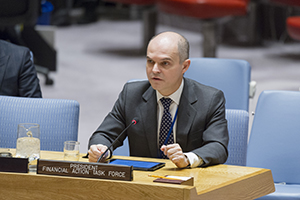United Nations Security Council, December 15, 2016
United Nations Headquarters, New York, 15 December 2016
Chairman,
 |
|
FATF President Juan Manuel Vega-Serrano at
the UN Security Council, 15 December 2016
UN Photo / Rick Bajornas
|
Financing is an essential component of proliferation.
Therefore, financial measures are one of the most effective tools to counter proliferation:
- Preventive measures make it difficult for criminals to raise and move funds, reducing the capacity of proliferation networks;
- Financial intelligence provides advance warning of attempts to illegally transfer sensitive goods and materials. Shipments can be discovered and interdicted on the basis of suspicious transaction reports by financial institutions.
- Every movement of goods has an associated financial transaction. Financial investigation can follow the money trails to look behind declarations, analyse proliferation networks, and identify facilitators.
-- The FATF’s Role --
The Financial Action Task Force is the global standard-setting body for combating money laundering and the financing of terrorism and proliferation, with a total of 198 jurisdictions included in our global network.
The FATF was established in 1989 to combat money laundering associated with drug trafficking, but has expanded its role since then. In 2001 we developed effective tools to fight terrorist financing. From 2008, in response to the increased threat of proliferation, the FATF took up the task of combating proliferation financing. Since then we have analysed how proliferation networks use financing and adopted international standards to tackle it.
The FATF Standards set specific requirements to give effect to UN Security Council Resolutions, including targeted financial sanctions to counter proliferation and terrorism. The standards are enforced through rigorous peer-review and follow-up procedures, which have greatly increased the number of jurisdictions which comply with the requirements. This gives the Security Council more effective tools.
It is important to underline that the role of the FATF in countering proliferation goes beyond targeted financial sanctions:
- We have built the infrastructure needed to combat the financing of proliferation: with criminal laws and investigative powers; due diligence and suspicious transaction reporting by financial institutions; and transparency requirements regarding the control of corporate vehicles and legal arrangements.
- We apply measures which weaken the ability of non-state actors to maintain facilitation networks and to raise or spend money.
- And the FATF provides guidance on cooperation and coordination both domestically and internationally
As a conclusion, the FATF standards provide a comprehensive basis for national measures to combat the financing of proliferation by both state and non-state actors.
-- Challenges and Next Steps --
However we still face important challenges:
- Some countries simply do not have the capacity to exercise effective controls. We need to support those countries.
- Manymore countries do not understand the risks and do not fully exploit the opportunities of financial intelligence to counter proliferation. More work is needed to link-up the relevant authorities in each country.
- Finally, at a global level, we need to make sure that emerging financial technologies can develop without being exploited for the purposes of terrorism or proliferation. One of the priorities of the Spanish Presidency of the FATF is, therefore, to establish a partnership with the Fintech community to ensure that new technological developments properly manage associated risks.
Mr Chairman, the financial measures which the FATF promotes are an important tool against proliferation. We stand ready to support further progress under the leadership of the Security Council.


 Twitter
Twitter
 Facebook
Facebook
 Instagram
Instagram
 Linkedin
Linkedin
